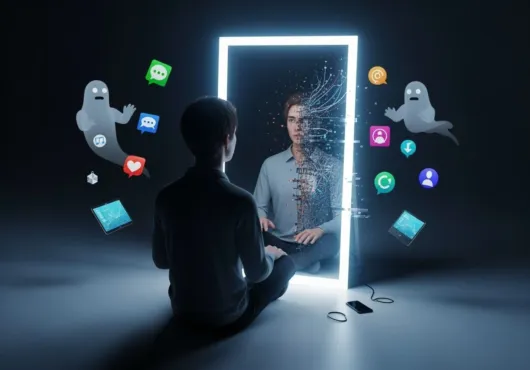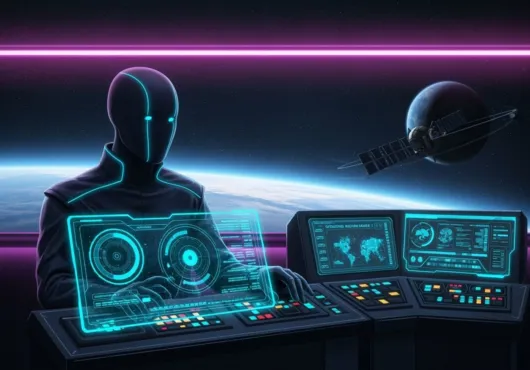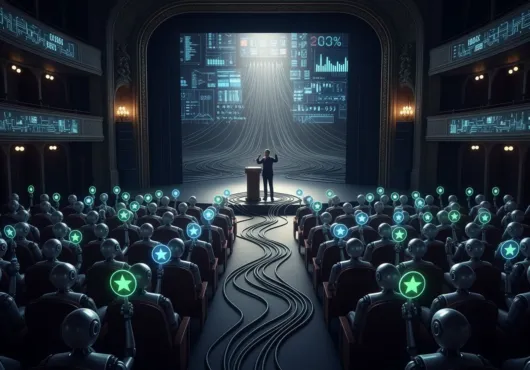AI isn’t coming. It’s already here—inside your apps, your job, your health, your relationships. But this next chapter? It’s about expansion, confrontation, and transformation.
Introduction: Beyond the Hype Machine
We’re not talking about flying cars or sentient machines in love. We’re talking about invisible infrastructure shifts, power transfers, and cultural rewrites. Here’s what’s next for AI—fact-anchored, fiction-aware, and future-critical.
AI Will Shift from Tools to Ecosystems
Today, AI is a feature. Tomorrow, it’s the platform.
Expect integrated systems: your calendar syncs with your mood-tracking wearable, which syncs with your shopping preferences, which triggers automated deliveries—run by your AI assistant trained specifically on your habits.
Prediction: Multi-modal, persistent AI agents will act as personal operating systems. Think ChatGPT meets Jarvis meets low-key life coach.
Risk: Total dependency. Algorithmic control disguised as assistance. Creeping loss of agency.
AI Will Blur the Line Between Brain and Machine
Neurotech startups are already embedding machine learning into wearables, neural interfaces, and emotion-responsive tech. Next? Mental bandwidth extensions, memory recall enhancers, and maybe even emotion “stabilizers.”
Prediction: AI-enhanced cognition will be sold as wellness, marketed as productivity, and distributed as a subscription.
Risk: Psychological manipulation, dopamine addiction loops, exploitative “mind hacks.”
AI Will Become Political Infrastructure
Governments are quietly adopting AI for law enforcement, benefits fraud detection, and social services automation. This isn’t the future—it’s happening now.
Prediction: Policy decisions will increasingly be “advised” by AI models. Automated surveillance will become the norm, not the outlier.
Risk: Algorithmic discrimination codified into law. No appeal system for black-box decisions. Citizens scored, sorted, denied—without explanation.
AI Will Reinvent Scientific Discovery
AI is already identifying new drug candidates, modeling proteins, and simulating materials at atomic scale. Expect exponential gains in biotech, climate science, and physics—if funding stays ethical.
Prediction: Entire scientific labs will be simulated. Breakthroughs will come from code, not people.
Risk: Knowledge monopolies. If one company owns the model that cures cancer, who gets to live?
AI Will Saturate Culture—Then Start Creating It
From screenplays to pop songs to memes, AI is already in the creative mix. But the future will bring mass cultural production driven by data-tested, algorithm-approved aesthetics.
Prediction: AI-generated content will flood entertainment. Viral hits will be engineered. Taste itself becomes an optimization problem.
Risk: Homogenization of culture. Loss of weirdness, resistance, and soul. Artists replaced by “prompt specialists.”
AI Will Force a Moral Reckoning
As AI eats more territory, the real debate won’t be about the tech—it’ll be about power. Who controls the models? Who decides the training data? Who gets left out? Who gets overwritten?
Prediction: Ethical frameworks will move from academia to activism. AI rights, data dignity, and algorithmic justice will become mainstream causes.
Risk: The fight will come too late. And the people affected most won’t be the ones building the systems.
Conclusion: The Future of AI Is a Mirror
AI won’t save us. It won’t destroy us. It’ll amplify us—our brilliance and our biases, our dreams and our damage.
The future of AI depends less on what the tech can do, and more on what we allow it to do. The question isn’t “Will AI change everything?”
It’s: “Who gets to decide what changes?”
Up Next: Read “The Dark Side of Productivity: How AI Tools Are Fueling Burnout” →


